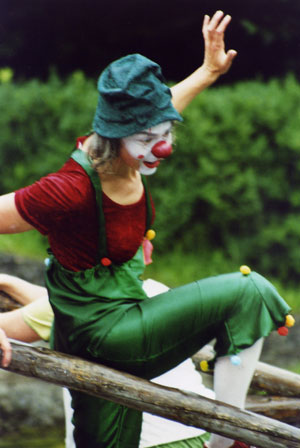Entertainer
Tasks & duties

Entertainers may do some or all of the following:
-
write and research performance routines
-
rehearse their acts
-
perform their acts in front of an audience
-
promote and publicise their acts
-
dress in costumes to suit their performances
Specialisations
Entertainers may specialise in the following performance areas:
-
juggling
-
magic
-
stilt walking
-
mime
-
acrobatics
-
aerial dance and circus arts
-
storytelling
-
hypnotism
-
clowning
Skills & knowledge
Entertainers need to have:
-
excellent performance skills
-
creative ability and skill in their speciality area
-
knowledge of different performance and acting techniques
-
knowledge of body posture and movement
-
knowledge of human behaviour and character development
-
understanding of safe work practices
-
good communication skills
Business, marketing, networking and planning skills are important, as most entertainers are self-employed and need to be able to create their own work opportunities.
Entry requirements
To become an entertainer you need to have natural ability and skill in the area you wish to perform. Some employers may prefer you to have experience in performing and entertaining.
Secondary education
A good level of spoken English is important for entertainers, and subjects such as drama, history, social studies and maths are useful. Participating in extracurricular activities, such as theatre sports and debating, is also useful.
Tertiary education
There are no specific tertiary educational requirements, but training in music, song, dance, drama or improvisation may be helpful for developing skills in entertaining. A Diploma in Circus Arts may also be useful for some entertainers.
Training on the job
Entertainers may train with experienced entertainers, or through clubs, workshops, summer schools and conferences, which may feature local and international entertainers. They may also train at drama schools or with theatre companies.
Entertainers must continually update their acts to keep them new and fresh. They do this in a variety of ways, for example, by research (such as seeing other shows and reading reviews) and customer feedback.
Useful experience
Useful experience for entertainers includes:
-
public speaking
-
busking
-
acrobatics
-
modelling
-
acting
-
dancing
-
singing
-
performing as a musician
-
artistic or creative work
-
any use of business and marketing skills
Some forms of entertainment, such as juggling and stilt walking, are mostly self-taught and it may be useful to join a local club to learn the basics and meet other interested people.
Related courses
Dance
Drama and Theatre Studies
Music
Nga Mahi a Rehia (Maori Performing Arts)
For more information, please refer to Career Services.
Document Actions
